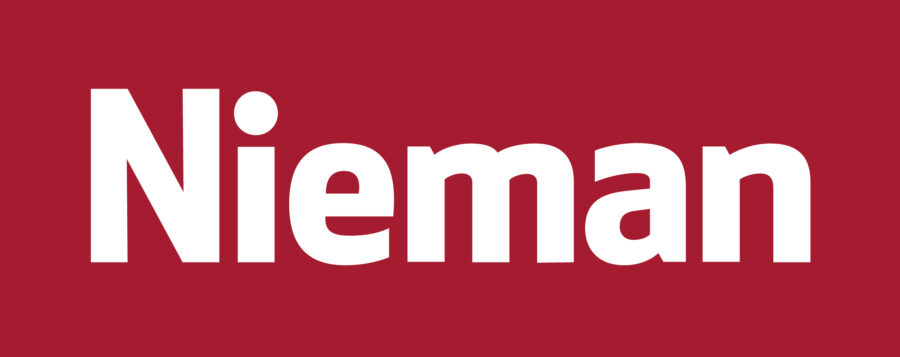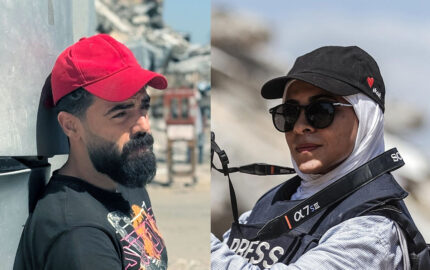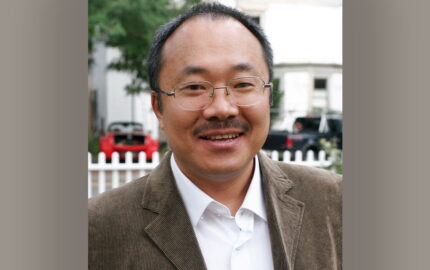CAMBRIDGE, Mass. (May 17, 2004) — Thirteen U.S. journalists and 12 international journalists were appointed to the 67th class of Nieman Fellows at Harvard University.
Established in 1938, the Nieman program is the oldest midcareer fellowship for journalists in the world. The fellowships are awarded to working journalists of accomplishment and promise for an academic year of study in any part of the university. More than 1,000 U.S. and international journalists have studied at Harvard as Nieman Fellows.
Here are the new U.S. fellows and their areas of interest:
MARY (MOLLY) BINGHAM, photographer, WorldPicture News Agency: To enhance textual storytelling capabilities to pair them with existing photography skills through the study of writing, journalism and history
CHERYL CARPENTER, deputy managing editor, The Charlotte Observer: The nature and practice of leadership and unique strategies for business development
RICHARD CHACON, deputy foreign editor, The Boston Globe: Religion, poverty and public health and their impact on the development of United States foreign policy
JAMES DALY, editor in chief, The George Lucas Educational Foundation: How nontechnical forces, including cultural and economic factors, shape the use and evolution of modern technologies
EDWARD GARGAN, Asia bureau chief based in Beijing, Newsday: The intersection of race, religion and politics in Latin America along with the state of Latin American popular culture
AMY GOLDSTEIN, White House domestic policy reporter, The Washington Post: The roots and implications of civil liberties-restricting policies that have been imposed as part of the effort to curb terrorism since the Sept. 11, 2001, attacks
JOSHUA HAMMER, Jerusalem bureau chief, Newsweek: The business operations of terror organizations: How they move money internationally; which governments aid radical groups; how charities, banks and money-transfer agencies deliver money to terror organizations and how effectively "coalition" governments have been at hindering the cash flow
LOUISE KIERNAN, projects reporter, Chicago Tribune: The role of women in the United States work force and its impact on social and labor-reform movements in the 20th century. She will hold the Louis Stark Memorial Fellowship for journalists who specialize in labor, workplace or related issues. Funding is provided by the Stark Fellowship Fund in honor of Louis Stark, a pioneer in the field of labor reporting.
MAGGIE MULVIHILL, investigative editor, The Boston Herald: The role of federal and state courts in barring access to public information and restrictions of press freedom since the Sept. 11, 2001, attacks
AMY ELLIS NUTT, feature writer, The Star-Ledger of Newark, N.J.: The social, legal and ethical implications of advances in neuroscience on the treatment, enhancement and manipulation of the human brain
H. JOSEPH O'CONNOR JR., producer, ABC News "Nightline": The nature of mental illness and treatments for mental disorders. Also Irish literature and history as they relate to personal heritage and storytelling
ELIZABETH RUBIN, contributing writer, The New York Times Magazine: Comparative religion, religious history and their impact on society; Arabic language; the concept of "American interests" and filmmaking
Twelve U.S. journalists were selected by a five-person committee: Charles A. Ferguson (Nieman Fellow 1966), retired editor of The Times Picayune of New Orleans; Maria Henson (Nieman Fellow 1994), assistant managing editor for enterprise of the Austin American-Statesman; Juliette Kayyem, senior fellow at the Belfer Center for Science and International Affairs at the John F. Kennedy School of Government at Harvard; Lester Sloan (Nieman Fellow 1976), freelance photographer and Web magazine publisher; and Bob Giles (Nieman Fellow 1966), committee chair and Nieman Foundation curator.
In addition to the 12 U.S. journalists selected by the committee, another fellow will join the class.
CHRIS WADDLE, vice president/news, The Anniston Star, and president, the Ayers Family Institute for Community Journalism: The reporting of globalism in the heartland. The study will prepare for the start of an original master's program he will lead for community journalism fellows with the University of Alabama inside The Star, a teaching newspaper.
Over the years, international Nieman Fellows have been selected from 76 nations around the world. Here are the new international fellows and their areas of interest:
ABSAR ALAM (Islamabad, Pakistan), special correspondent, The Nation: Explore the links between economic development and democracy along with politics and public policy. He is the Chiba-Nieman Fellow. The fellowship is supported by the Atsuko Chiba Foundation, established in memory of Atsuko Chiba, a Nieman Fellow in 1968.
LAURENCE BAGOT (Paris, France), economics reporter, Enjeux les Echos: Examine the increasing political and cultural divide between the United States and France by looking into American contemporary society and the nature of globalization
PATRICIA DANAHER (Dublin, Ireland), bureau chief, Republic of Ireland, Ulster Television: Explore the major changes in Irish society, in politics and in relation to institutional religion and the implication of those changes on the nation and its people
ROZA EFTEKHARI (Tehran, Iran), senior editor, Zanan Magazine: Gender issues and their impact on religious scholarship and practice, and the impact of religion on women's issues in the various interpretations of Islam as well as how other religions have faced feminism
ANA CRISTINA ENRIQUEZ (Monterrey, Mexico), co-editor, Vida! Periodico El Norte/Editora El Sol: The nature of economic and social stratification in Mexico and its impact on the nation and its people. She will be a John S. and James L. Knight Foundation Latin American Nieman Fellow.
HENRY J.J. JEFFREYS (Auckland Park, South Africa), deputy editor, BEELD: The impact of African journalism in responding to the emerging new democratic African society as envisioned by the New Partnership for Africa's Development and the challenges facing news reporting because of the globalization of news media institutions. Funding for his fellowship is provided by The Nieman Society of South Africa.
SERGIO KALILI (Sao Paulo, Brazil), reporter, Caros Amigos Magazine: The impact of journalism reporting on human rights abuses and the use of human rights to justify violence and war. He will be a John S. and James L. Knight Foundation Latin American Nieman Fellow.
YOUNG JIN KANG (Seoul, South Korea), team editor, JoongAng Ilbo: How nations, particularly South Korea, deal with sustaining growth in the face of mounting security challenges. His fellowship is supported by The Asia Foundation and the Sungkok Journalism Foundation.
INES POHL (Kassel, Germany), international news editor, HNA (Hessiche/Niedersachsische Allgemeine): The relationship among politics, religion and violence and how its impact is different in different societies
CERI THOMAS (London, England), head of news, BBC Radio Five: The social impact of declining audiences for news and participation in civic life, and the relationship between technology and news
RUSUDAN TSERETELI (Rustavi, Georgia), editor in chief, Rustavi-Info: American journalism as reflected in its history, politics, literature and art
THEPCHAI YONG (Bangkok, Thailand), group editor, The Nation Multimedia: Chinese economy, society and politics and the impact of China's rise as the dominant economic power in Southeast Asia. His fellowship is supported by The Asia Foundation.
In addition to the fellowships, the Nieman Foundation publishes the quarterly magazine Nieman Reports and is the home of the Nieman Program on Narrative Journalism and the Nieman Watchdog Journalism Project to encourage reporters and editors to monitor and hold accountable those who exert power in all aspects of public life.
Established in 1938, the Nieman program is the oldest midcareer fellowship for journalists in the world. The fellowships are awarded to working journalists of accomplishment and promise for an academic year of study in any part of the university. More than 1,000 U.S. and international journalists have studied at Harvard as Nieman Fellows.
Here are the new U.S. fellows and their areas of interest:
MARY (MOLLY) BINGHAM, photographer, WorldPicture News Agency: To enhance textual storytelling capabilities to pair them with existing photography skills through the study of writing, journalism and history
CHERYL CARPENTER, deputy managing editor, The Charlotte Observer: The nature and practice of leadership and unique strategies for business development
RICHARD CHACON, deputy foreign editor, The Boston Globe: Religion, poverty and public health and their impact on the development of United States foreign policy
JAMES DALY, editor in chief, The George Lucas Educational Foundation: How nontechnical forces, including cultural and economic factors, shape the use and evolution of modern technologies
EDWARD GARGAN, Asia bureau chief based in Beijing, Newsday: The intersection of race, religion and politics in Latin America along with the state of Latin American popular culture
AMY GOLDSTEIN, White House domestic policy reporter, The Washington Post: The roots and implications of civil liberties-restricting policies that have been imposed as part of the effort to curb terrorism since the Sept. 11, 2001, attacks
JOSHUA HAMMER, Jerusalem bureau chief, Newsweek: The business operations of terror organizations: How they move money internationally; which governments aid radical groups; how charities, banks and money-transfer agencies deliver money to terror organizations and how effectively "coalition" governments have been at hindering the cash flow
LOUISE KIERNAN, projects reporter, Chicago Tribune: The role of women in the United States work force and its impact on social and labor-reform movements in the 20th century. She will hold the Louis Stark Memorial Fellowship for journalists who specialize in labor, workplace or related issues. Funding is provided by the Stark Fellowship Fund in honor of Louis Stark, a pioneer in the field of labor reporting.
MAGGIE MULVIHILL, investigative editor, The Boston Herald: The role of federal and state courts in barring access to public information and restrictions of press freedom since the Sept. 11, 2001, attacks
AMY ELLIS NUTT, feature writer, The Star-Ledger of Newark, N.J.: The social, legal and ethical implications of advances in neuroscience on the treatment, enhancement and manipulation of the human brain
H. JOSEPH O'CONNOR JR., producer, ABC News "Nightline": The nature of mental illness and treatments for mental disorders. Also Irish literature and history as they relate to personal heritage and storytelling
ELIZABETH RUBIN, contributing writer, The New York Times Magazine: Comparative religion, religious history and their impact on society; Arabic language; the concept of "American interests" and filmmaking
Twelve U.S. journalists were selected by a five-person committee: Charles A. Ferguson (Nieman Fellow 1966), retired editor of The Times Picayune of New Orleans; Maria Henson (Nieman Fellow 1994), assistant managing editor for enterprise of the Austin American-Statesman; Juliette Kayyem, senior fellow at the Belfer Center for Science and International Affairs at the John F. Kennedy School of Government at Harvard; Lester Sloan (Nieman Fellow 1976), freelance photographer and Web magazine publisher; and Bob Giles (Nieman Fellow 1966), committee chair and Nieman Foundation curator.
In addition to the 12 U.S. journalists selected by the committee, another fellow will join the class.
CHRIS WADDLE, vice president/news, The Anniston Star, and president, the Ayers Family Institute for Community Journalism: The reporting of globalism in the heartland. The study will prepare for the start of an original master's program he will lead for community journalism fellows with the University of Alabama inside The Star, a teaching newspaper.
Over the years, international Nieman Fellows have been selected from 76 nations around the world. Here are the new international fellows and their areas of interest:
ABSAR ALAM (Islamabad, Pakistan), special correspondent, The Nation: Explore the links between economic development and democracy along with politics and public policy. He is the Chiba-Nieman Fellow. The fellowship is supported by the Atsuko Chiba Foundation, established in memory of Atsuko Chiba, a Nieman Fellow in 1968.
LAURENCE BAGOT (Paris, France), economics reporter, Enjeux les Echos: Examine the increasing political and cultural divide between the United States and France by looking into American contemporary society and the nature of globalization
PATRICIA DANAHER (Dublin, Ireland), bureau chief, Republic of Ireland, Ulster Television: Explore the major changes in Irish society, in politics and in relation to institutional religion and the implication of those changes on the nation and its people
ROZA EFTEKHARI (Tehran, Iran), senior editor, Zanan Magazine: Gender issues and their impact on religious scholarship and practice, and the impact of religion on women's issues in the various interpretations of Islam as well as how other religions have faced feminism
ANA CRISTINA ENRIQUEZ (Monterrey, Mexico), co-editor, Vida! Periodico El Norte/Editora El Sol: The nature of economic and social stratification in Mexico and its impact on the nation and its people. She will be a John S. and James L. Knight Foundation Latin American Nieman Fellow.
HENRY J.J. JEFFREYS (Auckland Park, South Africa), deputy editor, BEELD: The impact of African journalism in responding to the emerging new democratic African society as envisioned by the New Partnership for Africa's Development and the challenges facing news reporting because of the globalization of news media institutions. Funding for his fellowship is provided by The Nieman Society of South Africa.
SERGIO KALILI (Sao Paulo, Brazil), reporter, Caros Amigos Magazine: The impact of journalism reporting on human rights abuses and the use of human rights to justify violence and war. He will be a John S. and James L. Knight Foundation Latin American Nieman Fellow.
YOUNG JIN KANG (Seoul, South Korea), team editor, JoongAng Ilbo: How nations, particularly South Korea, deal with sustaining growth in the face of mounting security challenges. His fellowship is supported by The Asia Foundation and the Sungkok Journalism Foundation.
INES POHL (Kassel, Germany), international news editor, HNA (Hessiche/Niedersachsische Allgemeine): The relationship among politics, religion and violence and how its impact is different in different societies
CERI THOMAS (London, England), head of news, BBC Radio Five: The social impact of declining audiences for news and participation in civic life, and the relationship between technology and news
RUSUDAN TSERETELI (Rustavi, Georgia), editor in chief, Rustavi-Info: American journalism as reflected in its history, politics, literature and art
THEPCHAI YONG (Bangkok, Thailand), group editor, The Nation Multimedia: Chinese economy, society and politics and the impact of China's rise as the dominant economic power in Southeast Asia. His fellowship is supported by The Asia Foundation.
In addition to the fellowships, the Nieman Foundation publishes the quarterly magazine Nieman Reports and is the home of the Nieman Program on Narrative Journalism and the Nieman Watchdog Journalism Project to encourage reporters and editors to monitor and hold accountable those who exert power in all aspects of public life.


